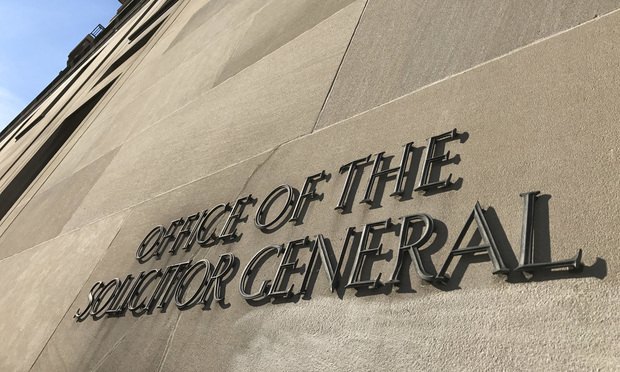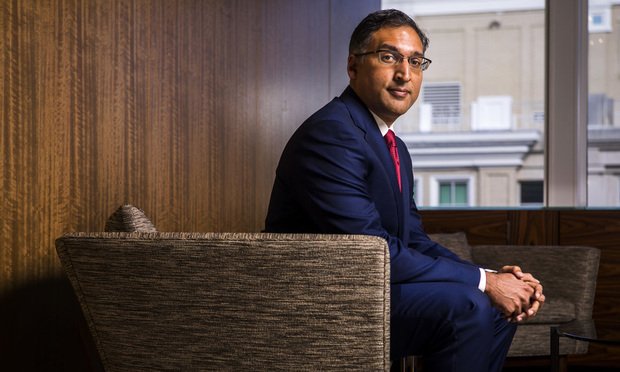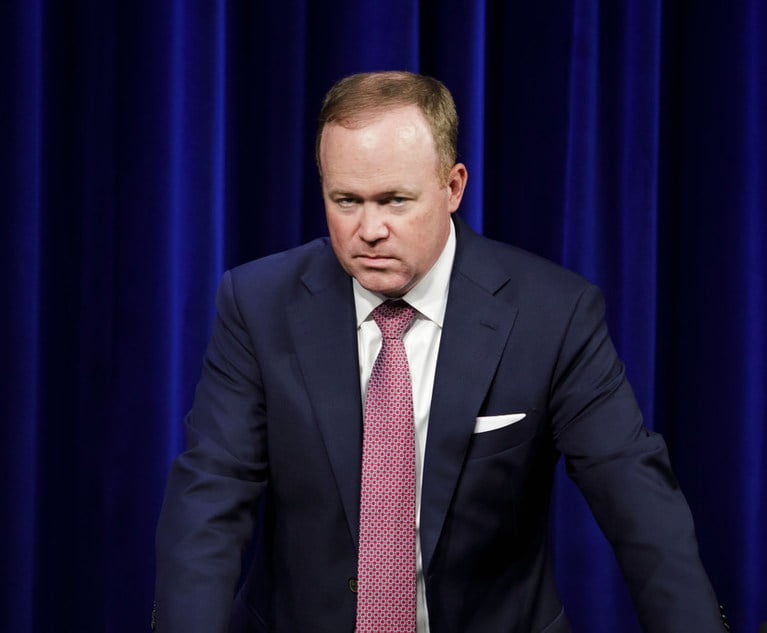DOJ Must Face Misconduct Inquiry in 'No Fly List' Case, SCOTUS Rules
The government, which has long denied any misconduct, urged the U.S. Supreme Court to review the Ninth Circuit's decision. The justices declined the invitation.
October 15, 2019 at 06:56 PM
5 minute read
 U.S. solicitor general's office at Main Justice. Credit: Mike Scarcella/ ALM
U.S. solicitor general's office at Main Justice. Credit: Mike Scarcella/ ALM
The U.S. Supreme Court on Tuesday refused to take up the Justice Department's challenge to a federal appeals court decision that lambasted government lawyers for their conduct in a case involving a former Stanford University graduate student wrongly placed on the "no-fly" list.
The U.S. Court of Appeals for the Ninth Circuit in January ordered a federal judge to take a fresh look at whether government lawyers acted in "bad faith" as they responded to Rahinah Ibrahim's claims that she never should have been included on the list. The appeals ruling said the government for years had played "discovery games, made false representations to the court, misused the court's time, and interfered with the public's right of access to trial."
In the course of the litigation, an FBI agent testified that he had misunderstood a form and marked the wrong boxes when he nominated Ibrahim for the no-fly list in 2004. A decade later, U.S. District Judge William Alsup described that move as "no minor human error but an error with palpable impact, leading to the humiliation, cuffing, and incarceration of an innocent and incapacitated air traveler."
"That it was human error may seem hard to accept—the FBI agent filled out the nomination form in a way exactly opposite from the instructions on the form, a bureaucratic analogy to a surgeon amputating the wrong digit—human error, yes, but of considerable consequence," Alsup wrote in the 2014 ruling.
Ibrahim, a Malaysian architect with a doctorate from Stanford, prevailed at trial against her designation on the government's "no fly list." Yet Alsup granted only a fraction of the hundreds of thousands of dollars in legal fees Ibrahim's lawyers had requested.
The Ninth Circuit's rebuke of government lawyers came in a decision that also faulted Alsup for errors in his review of the fees owed to Ibrahim's legal team.
The government, which has long denied any misconduct, urged the Supreme Court to review the Ninth Circuit's decision. The justices declined the invitation without comment. Justice Samuel Alito Jr. voted in favor of granting the Justice Department's petition.
Ibrahim was represented in the Supreme Court by a team from Hogan Lovells, including Neal Katyal, a former Obama-era acting U.S. solicitor general who was counsel of record. Federal officials have conceded that placing Ibrahim on the list was inadvertent.
"I was surprised that the solicitor general took this case to the Supreme Court. I feel like this administration has taken cases to the Supreme Court involving immigrants and individual rights that are surprising and unfortunate," Katyal said Tuesday in an interview. "When I took it, I realized the odds of getting the Supreme Court to deny certiorari when the solicitor general seeks it in a national security case are close to nil. But I wanted to try. And I was very pleased the Supreme Court did deny cert today."
 Neal Katyal, a partner with Hogan Lovells in Washington, D.C. Photo: Diego M. Radzinschi / NLJ
Neal Katyal, a partner with Hogan Lovells in Washington, D.C. Photo: Diego M. Radzinschi / NLJKatyal said he joined the case because he saw "a grave injustice that had happened, and then the government doubling down on that injustice."
"Having worked in government, I understand the government makes mistakes," he said. "What happened here was a repeated pattern of hiding those mistakes."
The Ninth Circuit decision recounted in detail Ibrahim's fight against her placement on the "no fly list."
"Dr. Ibrahim should not have had to endure over a decade of contentious litigation, two trips to the court of appeals, extensive discovery, over 800 docket entries amounting to many thousands of pages of record, and a weeklong trial the government precluded her (and her U.S.-citizen daughter) from attending, only to come full circle to the government's concession that she never belonged on the No Fly list at all—that she is not and never was a terrorist or threat to airline passenger or civil aviation security," Judge Kim McLane Wardlaw wrote for the panel.
The Justice Department argued in its petition at the Supreme Court that "far from being in bad faith, the government's actions were entirely proper and in accord with decisions of this court and the Ninth Circuit itself."
At the high court, U.S. Solicitor General Noel Francisco argued the Ninth Circuit's ruling "threatens to undermine the government's efforts to fairly but vigorously litigate to protect the public interest in the future. It also unfairly impugns the integrity of the career government attorneys faithfully carrying out their duty to defend the government's policies and protect its sensitive information."
Justice Department lawyers skewered the Ninth Circuit's ruling, saying the court engaged in "a wide-ranging and fundamentally misguided critique of the government's efforts to maintain the confidentiality and integrity of the No Fly List, and other government lists, with full respect for the judicial process."
Ibrahim's lawyers at Hogan Lovells disputed that the Ninth Circuit decision would carry any broader consequences for government lawyers.
"The crux of the Ninth Circuit's ruling is that if the government spends years litigating to conceal what it knew all along was a mistake, that may support a finding of bad faith," Katyal wrote. "This precedent will thus only affect those (hopefully) few cases where the government defends what it knows are errors affecting substantial individual rights."
This content has been archived. It is available through our partners, LexisNexis® and Bloomberg Law.
To view this content, please continue to their sites.
Not a Lexis Subscriber?
Subscribe Now
Not a Bloomberg Law Subscriber?
Subscribe Now
NOT FOR REPRINT
© 2025 ALM Global, LLC, All Rights Reserved. Request academic re-use from www.copyright.com. All other uses, submit a request to [email protected]. For more information visit Asset & Logo Licensing.
You Might Like
View All
Fight Over Amicus-Funding Disclosure Surfaces in Google Play Appeal

How We Won: BraunHagey’s $56M Trademark Win Over Molson Coors Upheld by 9th Circuit
8 minute read
Insurers Dodge Sherwin-Williams' Claim for $102M Lead Paint Abatement Payment, State High Court Rules

What Does Ohio Supreme Court's Opioid Decision Mean for Public Nuisance Claims?
6 minute readTrending Stories
- 1Exploring the Opportunities and Risks for Generative AI and Corporate Databases: An Introduction
- 2Farella Elevates First Female Firmwide Managing Partners
- 3Family Court 2024 Roundup: Part I
- 4In-House Lawyers Are Focused on Employment and Cybersecurity Disputes, But Looking Out for Conflict Over AI
- 5A Simple 'Trial Lawyer' Goes to the Supreme Court
Who Got The Work
J. Brugh Lower of Gibbons has entered an appearance for industrial equipment supplier Devco Corporation in a pending trademark infringement lawsuit. The suit, accusing the defendant of selling knock-off Graco products, was filed Dec. 18 in New Jersey District Court by Rivkin Radler on behalf of Graco Inc. and Graco Minnesota. The case, assigned to U.S. District Judge Zahid N. Quraishi, is 3:24-cv-11294, Graco Inc. et al v. Devco Corporation.
Who Got The Work
Rebecca Maller-Stein and Kent A. Yalowitz of Arnold & Porter Kaye Scholer have entered their appearances for Hanaco Venture Capital and its executives, Lior Prosor and David Frankel, in a pending securities lawsuit. The action, filed on Dec. 24 in New York Southern District Court by Zell, Aron & Co. on behalf of Goldeneye Advisors, accuses the defendants of negligently and fraudulently managing the plaintiff's $1 million investment. The case, assigned to U.S. District Judge Vernon S. Broderick, is 1:24-cv-09918, Goldeneye Advisors, LLC v. Hanaco Venture Capital, Ltd. et al.
Who Got The Work
Attorneys from A&O Shearman has stepped in as defense counsel for Toronto-Dominion Bank and other defendants in a pending securities class action. The suit, filed Dec. 11 in New York Southern District Court by Bleichmar Fonti & Auld, accuses the defendants of concealing the bank's 'pervasive' deficiencies in regards to its compliance with the Bank Secrecy Act and the quality of its anti-money laundering controls. The case, assigned to U.S. District Judge Arun Subramanian, is 1:24-cv-09445, Gonzalez v. The Toronto-Dominion Bank et al.
Who Got The Work
Crown Castle International, a Pennsylvania company providing shared communications infrastructure, has turned to Luke D. Wolf of Gordon Rees Scully Mansukhani to fend off a pending breach-of-contract lawsuit. The court action, filed Nov. 25 in Michigan Eastern District Court by Hooper Hathaway PC on behalf of The Town Residences LLC, accuses Crown Castle of failing to transfer approximately $30,000 in utility payments from T-Mobile in breach of a roof-top lease and assignment agreement. The case, assigned to U.S. District Judge Susan K. Declercq, is 2:24-cv-13131, The Town Residences LLC v. T-Mobile US, Inc. et al.
Who Got The Work
Wilfred P. Coronato and Daniel M. Schwartz of McCarter & English have stepped in as defense counsel to Electrolux Home Products Inc. in a pending product liability lawsuit. The court action, filed Nov. 26 in New York Eastern District Court by Poulos Lopiccolo PC and Nagel Rice LLP on behalf of David Stern, alleges that the defendant's refrigerators’ drawers and shelving repeatedly break and fall apart within months after purchase. The case, assigned to U.S. District Judge Joan M. Azrack, is 2:24-cv-08204, Stern v. Electrolux Home Products, Inc.
Featured Firms
Law Offices of Gary Martin Hays & Associates, P.C.
(470) 294-1674
Law Offices of Mark E. Salomone
(857) 444-6468
Smith & Hassler
(713) 739-1250






